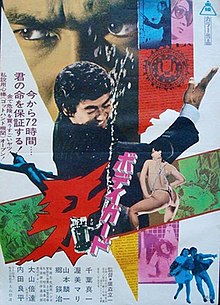Loading AI tools
1973 Japanese film From Wikipedia, the free encyclopedia
Karate Kiba or Bodyguard Kiba (ボディガード牙) is a 1973 Japanese martial arts film starring Sonny Chiba. It is based on an action manga by Ikki Kajiwara.[1][2]
This article needs additional citations for verification. (August 2014) |
| Karate Kiba | |
|---|---|
 Theatrical release poster | |
| Directed by |
|
| Written by | Ryūzō Nakanishi |
| Screenplay by | Ikki Kajiwara |
| Based on | Bodyguard Kiba by Ikki Kajiwara Ken Nakagusuku |
| Produced by |
|
| Starring | |
| Cinematography | Yohio Najakima Yoshio Nakajima Joel Shapiro (American footage) |
| Edited by | Osamu Tanaka |
| Music by | Toshiaki Tsushima Maurice Sarli (American release) |
Release dates |
|
Running time | 87 minutes |
| Country | Japan |
| Language | Japanese |
A recut version was released in the United States in 1976 as The Bodyguard, with added footage in the first ten minutes of the film.
Bodyguard Kiba was followed by the sequel Bodigaado Kiba: Hissatsu sankaku tobi, released later that same year. There were then three more film adaptations with Takeshi Yamato in the role of Kiba released in 1993, 1994, and 1995 by Takashi Miike at the beginning of his career.[3]
On his way home to Japan, karate master Kiba thwarts a terrorist attack on the airplane. He then gives a press conference, stating he saw the attack as a good opportunity to promote his karate school and announces that he's starting a bodyguard service. He is soon approached by his first customer, a woman who pays him for four days of protection but is secretive about the nature of the threat against herself. Kiba finds himself wrapped up in the international drug trade and has to fight the mafia.
On November 20, 2007, BCI Eclipse released the film in their Sonny Chiba Collection DVD set, which also includes Golgo 13: Assignment Kowloon, The Bullet Train, Dragon Princess, Karate Warriors, and Sister Street Fighter.[4]
Director Ryuichi Takamori released a sequel, Bodigaado Kiba: Hissatsu sankaku tobi on October 13, 1973.[5] The sequel also starred Sonny Chiba as Kiba Naoto.[6][7]
The American version of the film opens with a quotation:
The path of the righteous man and defender is beset on all sides by the iniquity of the selfish and the tyranny of evil men. Blessed is he, who in the name of charity and good will, shepherds the weak through the valley of darkness, for he is truly his brother's keeper, and the father of lost children. And I will execute great vengeance upon them with furious anger, who poison and destroy my brothers; and they shall know that I am CHIBA the BODYGUARD when I shall lay my vengeance upon them.
An altered version of the same passage (substituting "Chiba the bodyguard" with "the Lord"), complete with erroneous attribution to Ezekiel by the character of Jules Winnfield (Samuel L. Jackson), appears in Quentin Tarantino's 1994 film Pulp Fiction.
Seamless Wikipedia browsing. On steroids.
Every time you click a link to Wikipedia, Wiktionary or Wikiquote in your browser's search results, it will show the modern Wikiwand interface.
Wikiwand extension is a five stars, simple, with minimum permission required to keep your browsing private, safe and transparent.